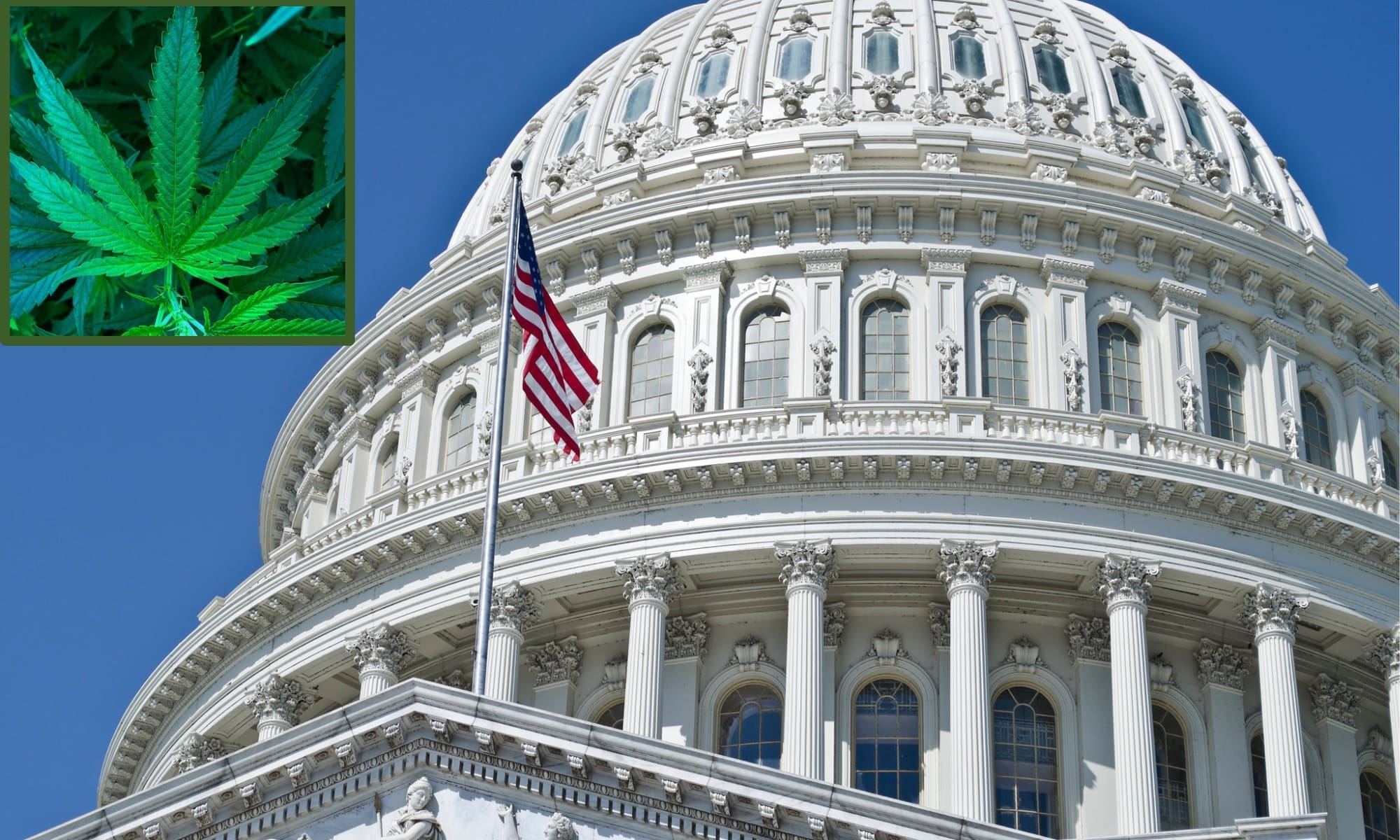Politics
Senate Bill To Federally Legalize Marijuana And Promote Social Equity Finally Filed By Schumer, Booker And Wyden

A much-anticipated U.S. Senate bill to federally legalize marijuana and promote social equity has finally been introduced.
Just over a year after first unveiling a draft version of the cannabis reform legislation, Senate Majority Leader Chuck Schumer (D-NY), Senate Finance Committee Chairman Ron Wyden (D-OR) and Sen. Cory Booker (D-NJ) formally filed the Cannabis Administration and Opportunity Act (CAOA) on Thursday. The news of an imminent release starting circulating last week.
Advocates and stakeholders have been eagerly awaiting this moment as leadership has worked to gather input on various provisions and build widespread buy-in. The final bill incorporates significant feedback received through more than 1,800 comments that were submitted following the draft’s release.
But with ongoing talks about reaching a passable compromise this Congress, it’s also possible that certain provisions attached to the new lengthy legislation could serve as building blocks for something else: a more incremental reform package that Schumer has been discussing with bipartisan offices in both chambers.
In any case, the main thrust of the now-filed 296-page legalization bill closely resembles that of the earlier version, which weighed in at a mere 163 pages—though the senators highlighted a number of changes, which generally expand on the draft.
For example, there are revisions concerning cannabis industry workers’ rights, a federal responsibility to set an impaired driving standard, banking access, expungements and penalties for possessing or distributing large quantities of marijuana without a federal permit.
The bill would also create a new federal definition for hemp that would increase the permissible THC by dry weight to 0.7 percent from the current 0.3 percent, but also make it so all THC isomers would be included in that total, not just delta-9 THC.
“For far too long, the federal prohibition on cannabis and the War on Drugs has been a war on people, and particularly people of color,” Schumer said in a press release, adding that CAOA “will be a catalyst for change by removing cannabis from the federal list of controlled substances, protecting public health and safety, and expunging the criminal records of those with low-level cannabis offenses, providing millions with a new lease on life.”
Big News: I’m introducing a bill today with @RonWyden and @SenBooker to remove cannabis from the federal list of controlled substances.
It will make criminal justice reforms. It will protect public health and safety. It will be a catalyst for change.
— Chuck Schumer (@SenSchumer) July 21, 2022
Schumer had said earlier this year that CAOA would be filed in April, but that didn’t happen. He then amended the timeline and made a “promise” to bring the bill forward ahead of the August recess. How far the measure will advance is yet to be seen, but the stage is now set for committee action as lawmakers work to potentially bring it to the floor.
To that end, a Senate Judiciary subcommittee chaired by Booker has scheduled a hearing for Tuesday that’s titled, “Decriminalizing Cannabis at the Federal Level: Necessary Steps to Address Past Harms.” Details about the meeting are limited, but now that CAOA has been filed, the bill is sure to be a focal point of the discussion.
—
Marijuana Moment is tracking more than 1,500 cannabis, psychedelics and drug policy bills in state legislatures and Congress this year. Patreon supporters pledging at least $25/month get access to our interactive maps, charts and hearing calendar so they don’t miss any developments.
![]()
Learn more about our marijuana bill tracker and become a supporter on Patreon to get access.
—
“As more states legalize cannabis and work towards reversing the many injustices the failed War on Drugs levied against Black, Brown, and low-income people, the federal government continues to lag woefully behind,” Booker said. “With strong restorative justice provisions for communities impacted by the drug war, support for small cannabis businesses, and expungement of federal cannabis offenses, this bill reflects long overdue, common sense drug policy.”
Our federal cannabis laws are outdated and unjust. With the introduction of Cannabis Administration and Opportunity Act, we can lift up communities most impacted by the failed War on Drugs, and create opportunities for small cannabis businesses to thrive. https://t.co/Rpqpb1RgRc pic.twitter.com/nZMiPJJZ2r
— Sen. Cory Booker (@SenBooker) July 21, 2022
While the sponsors have spent months discussing the proposal with offices across the aisle, there’s still a fair amount of skepticism about the prospects of reaching the 60-vote threshold needed to pass the measure through the Senate.
Republican senators are generally expected to oppose a measure to remove cannabis from the Controlled Substances Act (CSA), let alone one that would also impose a federal tax on marijuana sales and contains progressive social equity provisions such as automatic expungements for prior cannabis convictions.
It’s also not guaranteed that all Democratic members of the Senate will support the legislation. Several members have been either non-committal or signaled that they’d oppose it based on the original draft language. Democrats hold a slim majority in the chamber, so any dissent within the caucus could compromise the bill’s chances of passage.
As Senate Majority Leader, I say that it is past time to end the federal cannabis prohibition.
And the bill we’re introducing today will update our cannabis laws and help reverse decades of harm inflicted by the War on Drugs, especially on communities of color.
— Chuck Schumer (@SenSchumer) July 21, 2022
Next week’s Judiciary subcommittee hearing could offer important insights into how the bill as revised is being received on both sides.
Wyden said that he’d ask his Senate colleagues to “think long and hard about what keeping the federal government stuck in yesteryear means for public health and safety.”
“By failing to act, the federal government is empowering the illicit cannabis market, it’s ruining lives and propping up deeply rooted racism in our criminal justice system, it’s holding back small cannabis businesses from growing and creating jobs in their communities,” he said. “Cannabis legalization is here, and Congress needs to get with the program.”
It's past time for Congress to bring our nation's harmful, out-of-touch cannabis laws into the 21st century.
Today @SenSchumer @SenBooker and I introduced our legislation to end federal cannabis prohibition.
— Ron Wyden (@RonWyden) July 21, 2022
The overwhelming majority of Americans support legalization and live in a state where some form of cannabis is legal. Cannabis legalization is here, and Congress needs to get with the program.
— Ron Wyden (@RonWyden) July 21, 2022
The bill lays a framework that touches on a diverse array of cannabis issues—some of which have been addressed as standalone bills, others that are unique to CAOA—and that could be useful if lawmakers ultimately decide to take a different approach to reform. While Schumer pledged to bring a full legalization bill to the floor prior to becoming majority leader, both timing and political dynamics have raised questions about this measure’s path forward, especially as talks continue about an alternative, slimmed-down package.
Regardless, a year of coalition building—in concert with bipartisan offices, advocacy groups and stakeholders—has produced a final bill that Schumer feels is worth at least debating ahead of the November midterm election.
There’s already clear support for comprehensive legalization on the House side, as the chamber voted in April to pass a similar measure called the Marijuana Opportunity, Reinvestment and Expungement (MORE) Act. It stands to reason that CAOA would also enjoy majority support there if it manages to clear the Senate.
Here are the details of the key provisions of CAOA as introduced:
-Require the attorney general to finalize a rule removing marijuana from the CSA within 180 days of enactment.
-Impose a 5 percent federal excise tax on small- to mid-sized cannabis producers, which would gradually increase to 12.5 percent after five years. For large businesses, the tax would start at 10 percent and increase to a maximum of 25 percent.
-Only those 21 and older would be allowed to purchase recreational marijuana products, as is already the policy in states that have legalized for adult use.
-Expunge the records of people with low-level, federal cannabis convictions within one year of enactment, while allowing those currently incarcerated over marijuana to petition the courts for relief.
-Create a federal regulatory framework for the marijuana industry, with the Food and Drug Administration (FDA), the Bureau of Alcohol, Tobacco, Firearms and Explosives (ATF) and the Alcohol and Tobacco Tax and Trade Bureau (TTB) all playing key roles.
-Within FDA, there would be a Center for Cannabis Products responsible for regulating “the production, labeling, distribution, sales and other manufacturing and retail elements of the cannabis industry,” according to a summary.
-The Financial Crimes Enforcement Network (FinCEN) would need to update or issue new guidance clarifying to banks and credit unions that the policy change means that they can lawfully service legitimate cannabis businesses.
-States could choose to continue prohibiting marijuana production and sales, but they could not prevent transportation of cannabis products between legal states through their jurisdictions.
-Federal laws would still prohibit trafficking in states that ban marijuana and in legal states that impose laws for trafficking.
-Establish a grant program to fund non-profit organizations that provide job training, reentry services and legal aid. The program would be managed by a new Cannabis Justice Office under the Justice Department.
-DOJ grants would also go toward law enforcement hiring and community outreach to combat the illicit market.
-Separate Equitable Licensing Grant and Equitable Licensing Grant Programs would provide funding for states and localities to promote participation in the industry by minority and low-income people.
-Further, there would be a 10-year pilot program through the federal Small Business Administration “for intermediary lending” to provide “direct loans to eligible intermediaries that in turn make small business loans to startups, businesses owned by individuals adversely impacted by the War on Drugs, and socially and economically disadvantaged small businesses.”
-People could not be denied federal benefits due to the use or possession of marijuana or for a conviction for a cannabis offense. That includes preventing the revocation of security clearances for federal employees.
-Federal employment drug testing for marijuana would also be prohibited, with certain exceptions for sensitive positions such as law enforcement and those involving national security.
-Physicians with the U.S. Department of Veterans Affairs (VA) would be authorized to issue recommendations for medical cannabis to veterans.
-There would be measures taken to prevent diversion, including the establishment of a track-and-trace regime. Further, retail cannabis sales would be limited to 10 ounces in a single retail transaction.
-Federal law would be amended to explicitly state that SBA programs and services available to marijuana businesses and companies that work with them.
-The Government Accountability Office (GAO) would be required to facilitate a number of studies into marijuana policy—for example evaluations of the societal impact of legalization in states with recreational marijuana laws on the books, including information on impaired driving, violent crime and more.
-The Bureau of Labor Statistics (BLS) would need to compile demographic data on business owners and employees in the cannabis industry.
-Employers with federal cannabis permits required under the legislation that violate certain federal labor laws could see their permits rescinded—a bold policy proposal that would make the marijuana industry uniquely labor friendly.
-The U.S. Department of Health and Human Services (HHS) would be required to work with the National Institutes of Health (NIH) on ways to promote research into cannabis impacts. There would be a specific requirement to study the diversity of marijuana products available for research purposes.
-The bill calls for an increase in the quantity of cannabis that’s available for study purposes.
-There would be targeted public education campaigns meant to deter youth consumption. States would also receive funding for initiatives to prevent youth use and impaired driving, which would include money for education and enforcement.
-The Department of Transportation would be responsible for developing a standard for THC-impaired driving within three years of the bill’s enactment that states would be required to adopt, unless the secretary finds the department is unable to set such a scientific standard.
-The National Highway Traffic Safety Administration (NHTSA) would be tasked with collecting data on impaired driving, producing educational materials on the issue for states to distribute and carry out education campaigns.
-Vaping delivery system products that contain added natural or artificial flavors would be banned under the proposal.
Last year, Schumer emphasized that CAOA will specifically seek to restrict the ability of large alcohol and tobacco companies to overtake the industry.
Legalization advocates generally praised the unveiling of such a detailed and far-reaching cannabis bill by Senate leaders.
“The official introduction of this bill to finally end the policy nightmare of federal marijuana prohibition is the culmination of unprecedented leadership in the Senate and engagement with stakeholders across the political spectrum,” NORML Political Director Morgan Fox said. “We look forward to working with lawmakers to move this legislation toward passage and eagerly anticipate engaging in substantive conversations on all aspects of federal marijuana law with Senate members.”
“These conversations and hearings are long overdue,” he said. “The vast majority of Americans support comprehensive cannabis policy reform, and now is the time to figure out how to do that in a way that effectively addresses the damage done to marginalized communities and creates equitable opportunities in the burgeoning cannabis industry.”
Justin Strekal of Better Organizing to Win Legalization said that the bill’s introduction “marks a tectonic advancement in the movement to end marijuana criminalization, with a credible pathway to ending the 80-year failed experiment of prohibition.”
“As the bill moves through the legislative process, we will continue to rally the public to engage in the democratic process to support reformers and defeat those who stand in the way of progress,” he said.
(Disclosure: Strekal supports Marijuana Moment’s work with a monthly pledge on Patreon.)
U.S. Cannabis Council (USCC) CEO Steven Hawkins said that the bill’s introduction by the majority leader is itself “the strongest sign yet that cannabis prohibition in America is nearing its end.”
“We applaud the authors of the CAO Act for their leadership and vision,” he said. We are reviewing the updated legislative text and look forward to having substantive discussions on how to best transition away from the illicit market to a fully regulated, national market with opportunities for all.”
The changes to CAOA since the initial draft do show signs of compromise, both for the sake of conservative legislative interests but also for equity advocates who have spent months pushing for a final product that puts those most impacted by prohibition first.
On that latter point, there’s language in the banking section of the measure that would “encourage financial institutions to provide financial services to small or minority-owned businesses,” the summary says. The bill would also create “additional funding to Community Development Financial Institutions and as well as make additional investment in minority depository institutions to provide these organizations with the capital necessary to reach small and underserved businesses and consumers.”
The revised legislation also stipulates that while basic FDA standards must be met, the agency couldn’t stop a cannabis business from marketing marijuana food items. As FDA works to develop regulations for medical cannabis products, the revised text provides for a transition period to let businesses continue to sell in compliance with state regulations.
Expungements is another central equity goal of the bill that advocates provided feedback on, and the new text accordingly includes some changes, such as removing a blanket ban on relief for those with convictions that involve aggravating factors. To that end, it builds in discretion into the expungement process. And there would be not sentencing review requirement prior to a petition for relief being able to move forward, unlike in the draft version.
Additionally, in response to stakeholder feedback, there were changes made to the Opportunity Trust Fund mechanisms that might have delayed the distribution of social equity funds. “In order to accelerate the availability of funds, the introduced bill specifies funding levels for each program as a direct appropriation from the Treasury General Fund and requires the Secretary of the Treasury to reimburse the General Fund from revenues in the CAOA Opportunity Trust Fund,” the summary says.
The year-long push by Senate leadership to get the comprehensive legalization bill to the floor hasn’t just been a source of frustration for stakeholders who’ve wanted to see the reform move more expediently; it’s also created tension with advocates and pro-reform lawmakers who’ve argued in favor of passing bipartisan, incremental policy changes like the Secure and Fair Enforcement (SAFE) Banking Act to simply protect financial institutions that work with state-legal cannabis businesses.
That bill has passed the House in some form seven times at this point—most recently as part of a must-pass defense bill—but Schumer and colleagues have faced criticism over their insistence that broad reform must be enacted first, both as a matter of social justice and because they’ve feared that passing the banking bill first could compromise GOP support for CAOA.
Additionally, there are reportedly plans in the works to advance an alternative omnibus cannabis reform package if CAOA doesn’t garner enough support to be enacted. Offices in both chambers are said to be discussing a plan to advance what would effectively be an omnibus of incremental marijuana reforms, addressing issues like cannabis banking protections, Small Business Administration (SBA) assistance access and marijuana research, for example, but stopping short of descheduling cannabis. No formal deal has been reached at this point, however.
Meanwhile, a GOP congresswoman, Rep. Nancy Mace (R-SC), filed her own legalization bill last year titled the States Reform Act (SRA) that shares similar provisions to the Democratic-led proposals. It has not received committee consideration, but if the House flips following the midterms, some feel it could be a vehicle for reform should Republican assume control of the chamber.
There are serious questions about the prospects of passing any broad legalization bill in the current congressional climate, especially given the steep Senate vote threshold. But another looming question is what President Joe Biden would do if a legalization measure does ultimately arrive at his desk.
Despite supermajority support for the reform within his party, the president has maintained a firm opposition to adult-use legalization. Instead, he’s voiced support for modest changes such as decriminalization, rescheduling and continuing to allow states to set their own policies.
After more than a year in office, however, he’s yet to take any meaningful steps to make good on those campaign pledges. And days before the House passed the MORE Act in April, then-Press Secretary Jen Psaki reaffirmed that Biden’s position on legalization has not changed.
That said, the White House drug czar recently said that the Biden administration is “monitoring” states that have legalized marijuana to inform federal policy, recognizing the failures of the current prohibitionist approach.
The president also made his first substantive comments on cannabis policy this month, reaffirming to reporters that he doesn’t believe that people should be in prison over marijuana and stating that his administration is “working on” cannabis clemency issues.
Read the full Senate marijuana legalization bill below:
Cory Booker And Rand Paul Bill Would Force DEA To Let Patients Use Psychedelics And Marijuana
Image element courtesy of Tim Evanson.
















